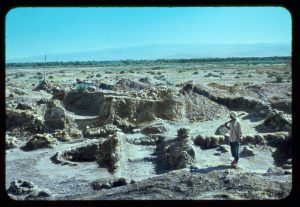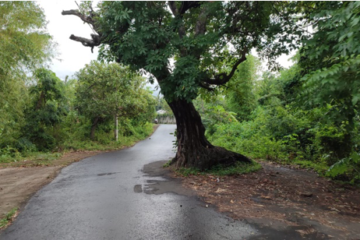Facing the Fall

“Burn it all down,” was the recent response of a friend when we were talking about the 2024 US election, the conflicts in Israel-Palestine, the rise of nationalisms everywhere, and the lack of governments around the world to respond adequately to global climate change. Though I argued back that such chaos would create more violence, and that chaos is a breeding ground for would be dictators, my friend’s reaction isn’t totally wrong. While I may not be as eager or willing to raze governments around the world to the ground and start all over, there is an element in which we should all face the fall.
I mean face the fall in the sense that we need to take seriously the need to adapt to climate change, to face the increasing reality of climate refugees, to face the resource conflicts that will likely only increase, to face the species and places and ways of life that will end due to climate change, and to face the increasing need for a different economic and political system around the planet that is not based on nationalism and neoliberal capitalism. Indeed, in terms of the latter, we may want to act in ways that help the system fail. If a system is inherently violent and unjust, then it may even be an ethical duty to help that system fail.
I also mean facing the fall in the sense that we must all deal with our own complicity in the global systems that support ecological and social violence. Whether that be facing our unearned privileges we might receive based upon race, class, sex, sexuality, physical/mental ability, and geographical location (after all, we probably didn’t do anything to be born in the bodies, places, and times that we were born into) or recognizing how our daily lives are tied up to the globalized fossil-fueled worlds in which we live. Recognizing the unique ways in which we are “fallen,” admitting our own complicities, might help us to bond together and work toward new ways of being in the world.
In this latter sense, of course I harken back to the old biblical fall, but not so much focused on the loss of some sort of paradisical Eden or original sin, as focusing on the story of Lot’s wife, who is famously turned into a pillar of salt for looking back at the destruction and fall of Sodom and Gomorrah. A couple of colleagues and I are working on a project (maybe just for ourselves) about how this story might help us to face the multiple falls that we are dealing with in our lives (in different ways). Personally, we are each facing the “fall” of our own lives in our late 40’s in addition to the falls resulting from climate change and fossil-fueled neoliberalism mentioned above. What might this mean and how does one face these falls ethically?
In the story of Lot, of course, it seems that looking back and facing the fall is punished: one is rewarded by “never looking back” and “always moving forward.” What if this focus on the future is part of our problem? We work toward a future in which we will always be young, in which we might terraform other planets as the Earth is continually degraded, where we will be successful, wealthy, and/or find ourselves on the “right” side of history. The future is young, beautiful, and limitless. Maybe this future-focused mentality, which is a mark of modernity and western, linear understandings of time, disables us from facing our pasts, and the ways in which our pasts are complicit in issues of ecological degradation, social injustices, and other forms of violence. Maybe this future-focused mentality disables us from seeing how we are deeply entangled with the circular-linear times of the planet: with evolutionary history, with seasons, with ecologies.
It seems to me that many Indigenous traditions are much better at facing the past (which here is facing the fall) in terms of understanding their cosmologies and origin stories as tied up with specific histories of specific landscapes. Furthermore, many of these ancient traditions have a great respect for the advice of elders and of ancestral worship. Finally, many are not only tied to specific landscapes but also tied up to the histories of animals and plants within those landscapes. In these senses, facing the entangled history of humans and the Earth involves a looking back into that entanglement more so than to a future where we might be free from those entanglements.
As has also been pointed out by many scholars, Indigenous peoples and enslaved peoples have had to face the fall of their own worlds due to colonization, genocide, and slavery. In this sense many have “faced” apocalypse and lived through it; they have faced the fall and persist, insist, and resist for the co-creation of new worlds that don’t lose the worlds in which they were once embedded. Maybe the co-creation of new worlds doesn’t so much depend upon the future promises of technology that will save us from our embeddedness and embodiments, but rather on technologies that help us face apocalypse, face the planetary, and face Gaia. In other words, technologies that help us to slow down and live within the entangled mess that is the ongoing process of nature naturing, rather than facing forward and outward toward ways that we (at least some of us) might escape.
In the end, I’m still not convinced the best way to face the fall is through “burning it all down” and starting over. This would suggest the erasure of what came before and a starting again ex nihilo. I’m not convinced that such utopic beginnings will not just recapitulate the old oppressions and *isms of what burned before. Instead of only looking forward and never facing the fall of the worlds in which we live, maybe we might be able to engage others in the falling worlds in which we live in more ecologically and just ways through facing our own falls.
#
Whitney A. Bauman is Professor of Religious Studies at Florida International University (FIU) in Miami, FL. He is also co-founder and co-director of Counterpoint: Navigating Knowledge. His areas of research interest fall under the theme of “religion, science, and globalization.” He is the recipient of a Fulbright Fellowship and a Humboldt Fellowship, and in 2022 won an award from FIU for Excellence in Research and Creative Activities. His publications include: Religion and Ecology: Developing a Planetary Ethic (Columbia University Press 2014), and co-authored with Kevin O’Brien, Environmental Ethics and Uncertainty: Tackling Wicked Problems (Routledge 2019); 3rd edition of Grounding Religion: A Fieldguide to the Study of Religion and Ecology, co-edited with Kevin O’Brien and Richard Bohannon, (Routledge 2023). He is also the co-editor with Karen Bray and Heather Eaton of Earthly Things: Immanence, New Materialisms, and Planetary Thinking (Fordham University Press 2023). His next monograph is entitled, A Critical Planetary Romanticism: Literary and Scientific Origins of New Materialism (Columbia University Press, forthcoming 2025).
Counterpoint blogs may be reprinted with the following acknowledgement: “This article was published by Counterpoint Navigating Knowledge on 7 January 2025.” The views and opinions expressed on this website, in its publications, and in comments made in response to the site and publications are those of the author(s) and do not necessarily reflect the views and opinions of Counterpoint: Navigating Knowledge, its founders, its staff, or any agent or institution affiliated with it, nor those of the institution(s) with which the author is affiliated. Counterpoint exists to promote vigorous debate within and across knowledge systems and therefore publishes a wide variety of views and opinions in the interests of open conversation and dialogue.
Photo credits: “Ruins of Sodom,” Dead Sea and Jericho area. Free download from Wikimedia Commons.



0 Comments